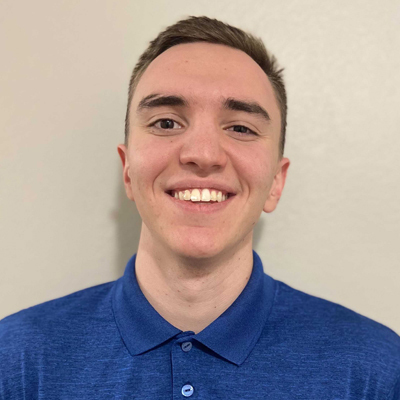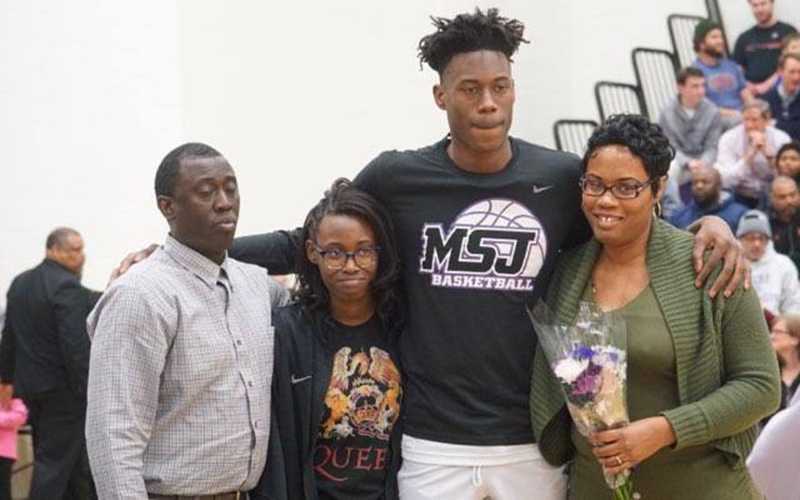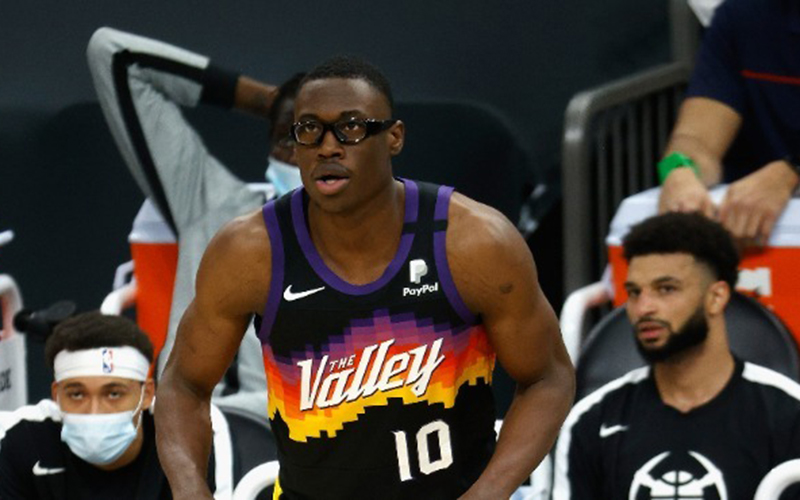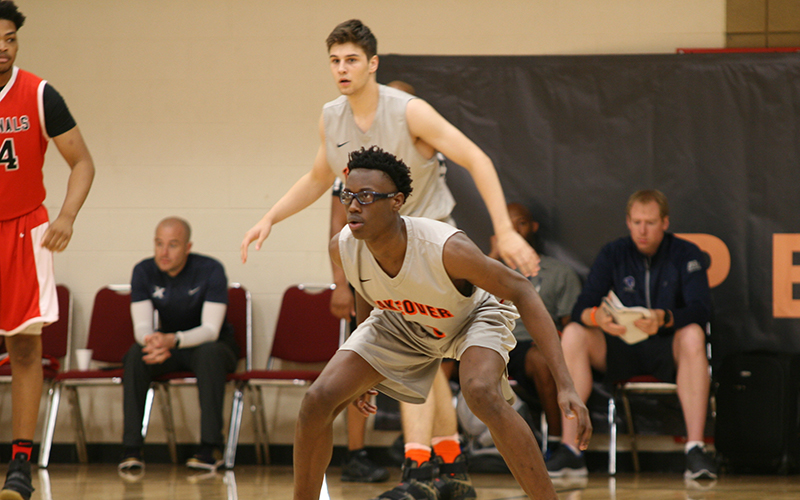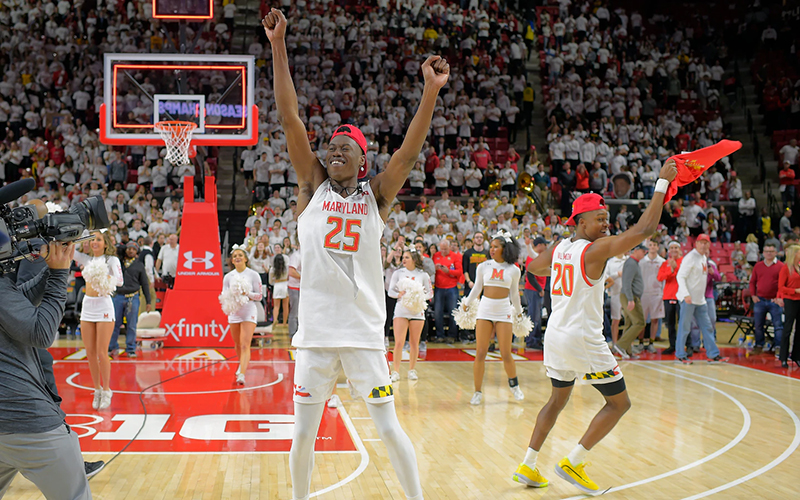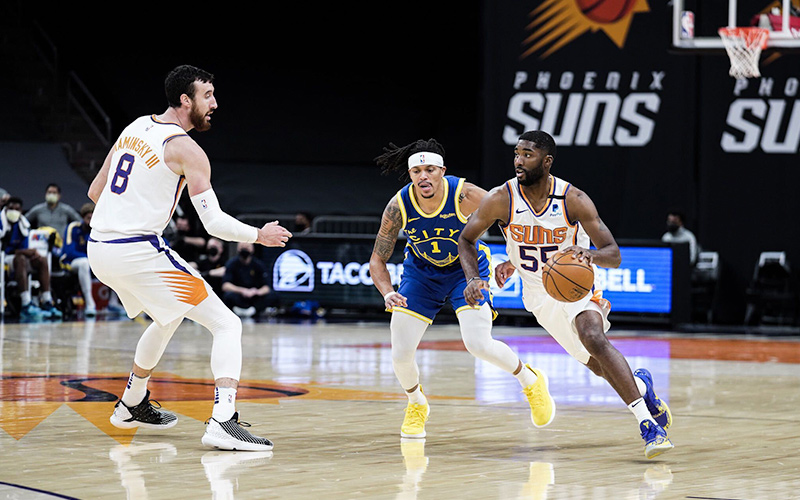PHOENIX — It’s 11:08 p.m., and the fans at Phoenix Suns Arena have cleared out with the team about 30 minutes removed from a one-point home win over the Milwaukee Bucks in an early February matchup.
With two days before the team’s next game against the Philadelphia 76ers, most of the Suns are likely looking forward to a rare day off before preparing for another Eastern Conference power. But from the east corner of the arena, Suns rookie Jalen Smith emerges and jogs back on the floor with two of the team’s staff members.
He’s ready to get back to work.
Smith spent the next several minutes shooting from the baseline, with one staff member rebounding his shots and the other passing to him from the 3-point line. That desire for extra repetitions, Smith said, was instilled in him by his father, Charles, when Smith was a young boy.
It has proven essential during what has been a challenging season for Smith, who the Suns selected with the No. 10 pick of the 2020 NBA Draft.
“I knew it was going to be a tough one for me,” Smith said. “So I decided, ‘If I’m here, I’m at the gym and I’m not being able to get into game, why not get up some game-like shots?’”
Smith left the court about 20 minutes later, uncertain when he would be back on it during a game. He didn’t play against the Bucks that night and has not for most of his first season, playing just 79 minutes across the 18 games in which he has appeared.
The lack of playing time has been no fault of Smith’s. He was unavailable for 10 of Phoenix’s first 13 games due to a left ankle injury and a subsequent positive COVID-19 test and fell out of coach Monty Williams’ rotation.
He and other rookies also did not have a normal build-up to their NBA careers, missing critical development time because of the cancellation of the NBA Summer League and quick turnaround to the 2020-21 season following the Nov. 18 NBA Draft.
The unique challenges could easily overwhelm Smith, who has found success throughout his basketball career. But he has been conditioned to push through scenarios like these, not shy away from them.
“I’m not worried about that, because I know how good of a player I am, and the coaching staff and the organization know how good of a player I am,” Smith said. “It’s just a matter of time for me to put it all together and get it all clicking and be able to continue to put it on the court.”
The Rules
At 4 years old, Smith was given four rules by his father, who was deployed from his family’s Baltimore-area home every six to 10 months as a Naval officer during much of Smith’s childhood.
“Make sure the doors are locked. Take out the trash. Do your chores. And don’t cause your mom any issues.”
Smith’s mother, Orletha, laughed as she recalled how closely her son took those tasks to heart.
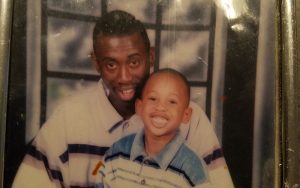
Smith’s father, Charles, taught his son about discipline and work ethic. (Photo courtesy of Orletha Smith)
“He (Charles) just told him, ‘While I’m gone, you have to take care of your sister and mom,’” Orletha said. “‘You’re the man of the house now.’ My 4-year-old son thinks he’s my husband, and that’s how it was.”
Smith did not get to spend consistent time with his father, who served in the Navy until Smith was a teenager, making it important that he gravitated toward the military lifestyle and routine for the sake of his family.
Witnessing his father’s aptitude for discipline and structure, Smith ingrained those traits into his personality. Whereas most children push away tasks like homework and chores, Smith was not satisfied unless he embraced them. If he did not meet his own expectations, he held himself accountable to be better.
As he grew older, Smith began to see the benefits of his regimen. He successfully took care of his mother and younger sister, Kiara, until his father retired from the Navy in 2015 and was an honor-roll student through his senior year at Baltimore’s Mount Saint Joseph High School. He also served as an elementary school tutor and mentor for students with special needs, impacting lives beyond his immediate family.
“He’s a very obedient kid,” Orletha said. “He’s not rebellious. He’s smart, and he’s spiritual. But he doesn’t go against the grain. Most of the time in his life, the structure has always been to his benefit.”
When Smith was introduced to basketball at 9, he was reminded by Charles that a similar focus would be necessary for success to follow.
“I told him that in order to be great at anything, he has to always work and become a sponge,” Charles said. “This was important because I felt that, if he knew that he always had to put in the work, then there’s always going to be another level that he must reach – no matter what it pertained to.”
The work started with early morning shooting sessions with his father as a young boy, and Smith’s basketball career took off when he was an eighth grader, according to his mother. He made the Gaels’ varsity basketball team as a freshman and competed for AAU programs Maryland 3D, Team Sizzle and Team Takeover on the Nike EYBL circuit.
By the time his career at Mount Saint Joseph ended, Smith was a McDonald’s All-American, two-time Maryland Gatorade Player of the Year and a consensus five-star recruit.
But those honors did not come without disappointments.
As a freshman in high school, Smith grew frustrated, his mother said, when he did not play in the fourth quarter for most games. He also was not selected for the 2016 USA Men’s Basketball U17 World Championship Team before his junior season, a particularly discouraging moment.
But from his family, Smith learned that it was trivial to worry about things he could not control. It was a lesson that loomed over subsequent challenges in his career.
“I told him that everyone’s opinion about him doesn’t matter, that he needed to focus on what his coaches, teammates and the people in his inner circle said to him,” Charles said. “He was also told that he needed to accept constructive criticism the same way he welcomed praise.”
On to the Terrapins
In June of 2017, Smith committed to play college basketball at his hometown school, the University of Maryland, becoming the second-highest rated prospect by the 247Sports Composite to ever sign with the program.
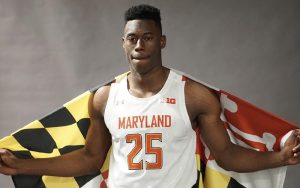
A consensus five-star prospect, Smith became the second-highest rated basketball recruit to sign with hometown University of Maryland by 247Sports. (Photo courtesy of Orletha Smith)
Terrapins assistant coach Orlando ‘Bino’ Ranson first spotted Smith at a tournament in the Spooky Nook Sports complex in Manheim, Pennsylvania, and came away impressed with Smith’s talent and his character.
“What helped build our relationship, he was a mature kid I thought,” Ranson said. “We’d have conversations about things outside of basketball. Anytime you’re able to do that, it enables you to build a relationship with somebody and have it to grow.”
Smith started all 33 of the games he played in Maryland as a freshman during the 2018-19 season, averaging 11.7 points and 6.8 rebounds per game en route to Big Ten all-freshman honors. He shared a formidable frontcourt with former Maryland center Bruno Fernando, a first-team all-conference selection who was taken by the Philadelphia 76ers with the 34th pick in the 2019 NBA Draft and traded to the Atlanta Hawks.
Despite his individual and team success – the Terrapins finished with a 23-11 record and advanced to the second round of the NCAA Tournament – Smith experienced a heartbreaking conclusion to his first season.
After hitting a game-tying 3-pointer with 25.8 seconds left in Maryland’s Round of 32 contest against third-seeded Louisiana State, Smith allowed then-Tiger sophomore guard Tremont Waters to score a game-winning layup with 1.6 seconds remaining, ending his team’s season.
One of the lasting images from that game was Smith’s postgame reaction: crying with his goggles removed and under the arm of Fernando.
It was a moment that could have deterred Smith’s development as a player. But he decided to trust his upbringing, knowing there was only one way to alleviate his pain:
Get back to work.
“Right away, Jalen knew after the LSU game that he wanted to come back to college and get better and polish his skills,” Ranson said. “And that’s exactly what happened.”
Smith did not test the 2019 NBA Draft process and instead returned to Maryland and improved himself in several areas. He added 10 pounds to his frame, according to the Terrapins’ athletic website, up to 225 pounds. And he boosted his 3-point percentage to 36.8 percent his sophomore year, a product of thousands of extra shots before and after practice with former Terrapin graduate assistant Brenton Petty.
With Bruno in the NBA and former Maryland forwards Makhel and Makhi Mitchell electing to enter the transfer portal in December 2019, Smith was often forced to play out of position at center but still improved his averages to 15.5 points and 10.5 rebounds per game, earning All-Big Ten first-team and defensive team honors and third-team All-American recognition by multiple outlets.
Following the disappointing loss in the NCAA Tournament a year earlier, Smith’s persistence led to the Terrapins winning a share of their first-ever Big Ten regular-season championship with a 14-6 conference record in 2019-20, a rewarding moment for him and his team.
“You knew he was going to come back and work his tail off,” Ranson said. “And that’s exactly what he did.”
But soon after, Smith was faced with another challenging situation. The COVID-19 pandemic led to cancellations of the Big Ten and NCAA Tournament, respectively, ending Maryland’s season prematurely and bringing an important decision into focus.
Considering his improvements, Smith was expected to be a future first round pick if he declared for the draft, though his ensuing process would be more uncertain. Despite those circumstances, he was encouraged by Ranson and Maryland coach Mark Turgeon to pursue his NBA career.
“It was some conviction of coming back because obviously, my main goal was to win a national championship and that’s what I always wanted to do,” Smith said. “But I mean, things just didn’t fall into play that way, and it pushed me into a whole new path.”
Smith announced his intentions to enter the 2020 NBA Draft on April 7, thanking his family, coaches and teammates in a social media statement. The next few months would be daunting for him, but he knew that he could bet on himself, having pulled through before.
“I was like, ‘You know what? It’s time to just move on from that and just use that feeling of emptiness and just bringing it into the NBA,’” Smith said. “‘Get myself an NBA championship, any way possible.”
More challenges, more work
Smith was ready to begin the most important chapter of his life, but the circumstances of the world would make it challenging.
Due to the pandemic, the NBA Draft was twice delayed from June 25 to Nov. 18, which was eight months after Smith played his last game at Maryland. The draft combine – typically a multi-day showcase in Chicago, where players are measured and take part in timed drills and scrimmages against other prospects – was instead hosted in NBA markets and done virtually beginning on Sept. 28, limiting typical evaluation for teams and scouts.
Through those changes, Smith remained at work with his training team, which included Team Takeover President Keith Stevens and two other coaches who had been with the program, Ray Brewer and Darren McLinton. They prepared at The Foundation School in Upper Marlboro, Maryland, outside of a temporary hiatus in which gyms were closed at the order of Maryland Gov. Larry Hogan.
In that span, Smith worked on improving his strength and maximizing his versatility. Individual work was often the only thing he could do, as the only live periods he was able to take part in were 4-on-4 sessions on Friday, never 5-on-5 basketball.
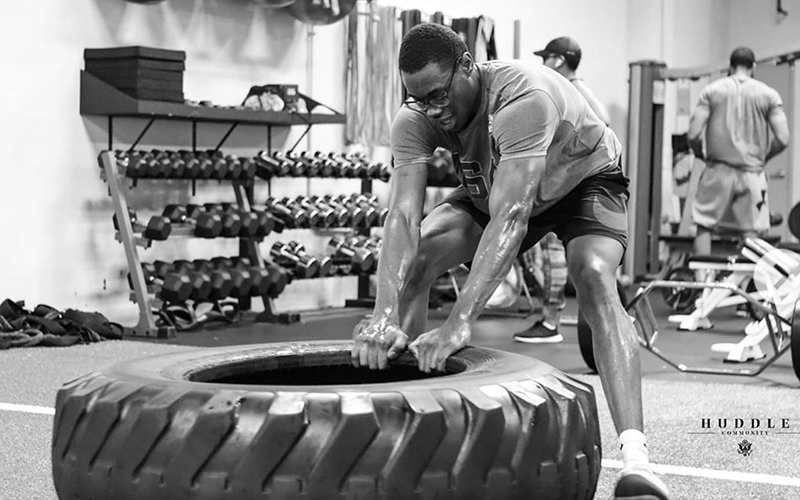
Smith had a reputation, even when he was younger, for an impressive work ethic. (Photo courtesy of Orletha Smith and Huddle Community)
“He was constantly in work mode,” Orletha said. “But when he actually was going through the draft, it was mainly his agents and his management that was providing us with insight and feedback. It wasn’t anything we could do, it was just on pins and needles.”
Following the NBA Draft Lottery in August, Smith was widely projected as a mid- to late-first round draft pick. With virtual interviews taking place, he said he spoke with “pretty much every team in the NBA.”
However, there was only one organization he met with more than once: the Suns.
Smith first met with Phoenix General Manager James Jones on a Zoom call and then followed up with Jones and Williams, who went to Potomac High School in Oxon Hill, Maryland. Beyond that connection, Smith said he was attracted to the Suns’ vision and focus under Williams, who has been described by players as a detail-oriented leader who tries to get the best out of his team each day.
“For some reason, I’ve always been attracted to coaches that’s harder on me,” Smith said. “I never really like a coach that just lets me do anything I want, because I feel as though I’m not getting much out of it.
“When I feel as though they’re actually hounding on me and wanting me to do something, they actually care about my development and me as a person. So it fits both worlds for me.”
Smith’s personality fit the culture of the Suns, too. Under Jones, Phoenix has tried to build a winning culture with disciplined, regimented players, something Jones saw during his career, which included three NBA championships.
On Nov. 18, Phoenix selected Smith with the No. 10 pick in the draft, a surprising choice to many around the league. But for Jones, Williams and the Suns, it was the right one.
“We identified him not only as a good player, but as a professional college player,” Jones told reporters in a press conference following the NBA Draft. “He’s extremely disciplined, regimented and he’s a tireless worker. And his approach fits our approach.”
Once he was selected by the Suns, Smith cried under the arms of his mother and father, this time tears of joy and accomplishment. But he knew there was still work to be done. For Smith, there always is.
“They want him to be aggressive, they want him to believe in himself,” Orletha said of the Suns’ vision for her son. “He’s working on his weight and his strength, his skill set. They want to play him the five and the four, but he’s got to bulk up for that. They want him to learn and understand the game of basketball, and they’re teaching him that.”
‘In good spirits’
When the NBA All-Star break took place during the weekend of March 7, it was a welcome opportunity for many players to get away from basketball, especially amid a compressed schedule in which teams have often played several games in a week and multiple back-to-back sets.
The Suns’ rookie continued to work on his game, even with his mother and father visiting the week after. Other than his birthday on March 16, he worked out multiple times per day and spent the rest of his time resting and preparing for games.
“It was good,” Orletha said. “He was in good spirits and the team was working out. He was busy, we got to celebrate his birthday and I got to see some games that weekend. But he was doing well.”
Smith has felt no other choice than to continue developing as much as possible, something instilled in him by his father and a big reason why he was selected by Phoenix. After appearing for 16 minutes during the Suns’ season opener against the Dallas Mavericks on Dec. 23, he rolled his ankle during their second game against the Sacramento Kings, delaying his return until Jan. 6 against the Toronto Raptors.
Smith did not play in that game and was subsequently placed in the NBA’s health and safety protocols for what turned out to be a positive COVID-19 test. It took him away from the court until Jan. 22 and depleted his conditioning and game reps, something he needed with key development time already taken away.
And once an NBA season is underway, even in a normal 82-game season, practice time is limited, giving younger players little opportunity to break into a rotation barring injuries or trades.
Smith was later assigned to the Agua Caliente Clippers of the NBA G-League in mid-February, with the Suns hoping to find him minutes while they were on a successful run of games. He was recalled from the G-League by Phoenix on Feb. 26.
“I’m actually a bit tougher on him because I know he can be a good player and he didn’t get that time,” Williams said when Smith returned from his positive COVID-19 test. “So there are times in practice where I think he might feel a bit picked on, but I think I owe it to him because it is the worst time to be a rookie in this league. And for me it’s like, the talent that he has and the ability he has, we’re just trying to throw it all at him so he can get it. “
Smith invites Williams’ approach.
“The way Monty coaches, he says that when he gets on you he’s not calling you out, he’s calling you up,” Smith said. “And that’s pretty much, I guess you would say, putting you up to the challenge. And it’s pretty much an everyday thing to me because I’m still learning, I’m still trying to get adjusted to the team and the playstyle and still trying to find my role. Every day is just something new.”
Despite those frustrations, Smith has not let them get the best of him. He has continued to be a sponge, like his father advised, soaking up everything he can from teammates like Chris Paul, Devin Booker and Deandre Ayton along with Phoenix assistant coach Mark Bryant, who works individually with Smith.
Smith’s mentality has helped him persevere through difficult situations in his life and be his best self for those around him. He doesn’t believe his NBA development will be any different.
For that, he thanks his dad.
“Not many people would be able to cope with coming from college, playing 40 minutes every night, being the star to just being that guy on the bench that’s clapping and cheering everybody on and giving that energy and effort,” Smith said.
“And I feel as though I credit that all to him because, if he never did that to me, then I wouldn’t have the responsibility or the accountability to hold myself to that standard of, just keep working and making sure that I’m making every day count.”
